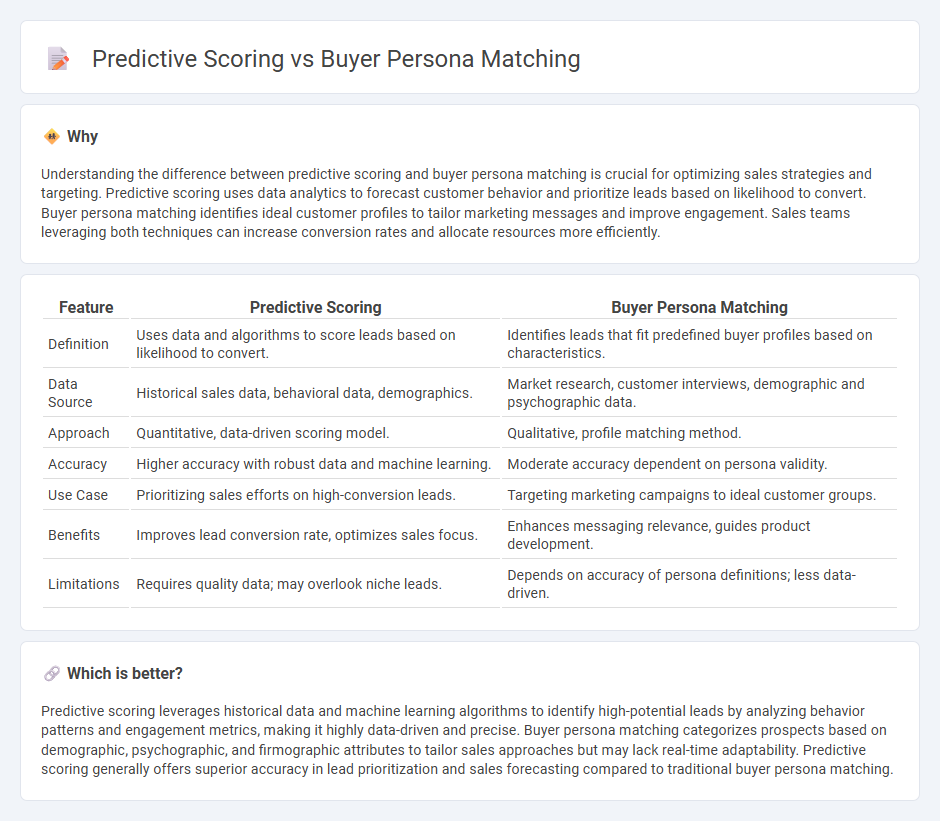
Predictive scoring uses data analytics and machine learning to forecast a lead's likelihood to convert, enhancing sales efficiency through targeted outreach. Buyer persona matching focuses on aligning prospects with predefined customer profiles based on demographics, behaviors, and pain points to tailor marketing strategies. Explore how combining predictive scoring and buyer persona matching can revolutionize your sales process.
Why it is important
Understanding the difference between predictive scoring and buyer persona matching is crucial for optimizing sales strategies and targeting. Predictive scoring uses data analytics to forecast customer behavior and prioritize leads based on likelihood to convert. Buyer persona matching identifies ideal customer profiles to tailor marketing messages and improve engagement. Sales teams leveraging both techniques can increase conversion rates and allocate resources more efficiently.
Comparison Table
| Feature | Predictive Scoring | Buyer Persona Matching |
|---|---|---|
| Definition | Uses data and algorithms to score leads based on likelihood to convert. | Identifies leads that fit predefined buyer profiles based on characteristics. |
| Data Source | Historical sales data, behavioral data, demographics. | Market research, customer interviews, demographic and psychographic data. |
| Approach | Quantitative, data-driven scoring model. | Qualitative, profile matching method. |
| Accuracy | Higher accuracy with robust data and machine learning. | Moderate accuracy dependent on persona validity. |
| Use Case | Prioritizing sales efforts on high-conversion leads. | Targeting marketing campaigns to ideal customer groups. |
| Benefits | Improves lead conversion rate, optimizes sales focus. | Enhances messaging relevance, guides product development. |
| Limitations | Requires quality data; may overlook niche leads. | Depends on accuracy of persona definitions; less data-driven. |
Which is better?
Predictive scoring leverages historical data and machine learning algorithms to identify high-potential leads by analyzing behavior patterns and engagement metrics, making it highly data-driven and precise. Buyer persona matching categorizes prospects based on demographic, psychographic, and firmographic attributes to tailor sales approaches but may lack real-time adaptability. Predictive scoring generally offers superior accuracy in lead prioritization and sales forecasting compared to traditional buyer persona matching.
Connection
Predictive scoring uses data analytics to evaluate the likelihood of a lead converting, directly enhancing the accuracy of buyer persona matching by aligning scores with specific customer profiles. Integrating these methodologies improves sales targeting and prioritization, leading to higher conversion rates and optimized resource allocation. Leveraging both predictive scoring and detailed buyer personas enables sales teams to focus efforts on prospects with the highest potential value.
Key Terms
Ideal Customer Profile (ICP)
Buyer persona matching involves aligning potential customers with predefined archetypes based on demographics, behaviors, and pain points, while predictive scoring leverages data analytics and machine learning to forecast the likelihood of a lead becoming a valuable customer. Both approaches prioritize the Ideal Customer Profile (ICP), which defines the characteristics of the most profitable and engaged customers, but predictive scoring refines targeting by quantifying fit and intent at scale. Discover how integrating these methods can enhance your ICP alignment and drive smarter customer acquisition strategies.
Lead Scoring Model
Buyer persona matching evaluates leads based on demographic and behavioral attributes aligning with ideal customer profiles, while predictive scoring uses machine learning algorithms to analyze historical data and forecast lead conversion likelihood. The lead scoring model benefits from combining both approaches by integrating qualitative persona insights with quantitative predictive analytics for enhanced accuracy and prioritization. Explore further to understand how integrating buyer persona matching with predictive scoring elevates lead qualification strategies.
Behavioral Data
Behavioral data plays a crucial role in both buyer persona matching and predictive scoring by capturing how users interact with products and services, revealing intent and engagement patterns. Buyer persona matching relies on behavioral insights to align customers with predefined profiles, improving targeting accuracy, while predictive scoring uses advanced analytics on behavioral signals to forecast future buying actions with high precision. Explore more to understand how integrating behavioral data enhances marketing strategies and sales outcomes.
Source and External Links
Revenue Radar(tm): Finding the Right Type of Buyer Using Persona Scoring Models - Persona scoring models apply AI and machine learning to match your database and inbound leads with the most relevant buyer personas, helping identify and target the right buyers with tailored messages based on a comprehensive set of attributes beyond just job title.
The Ultimate Guide to Creating Buyer Personas (2024) - Shopify - Creating buyer personas involves developing detailed one-page profiles that capture key demographics, behaviors, frustrations, and motivations of your ideal customers to tailor marketing efforts effectively.
Understanding Buyer Personas - Madison Logic - Effective buyer persona matching entails detailed profiling, integrating multiple data sources, analyzing engagement patterns, and continuously refining personas to engage all decision-makers appropriately throughout their buyer journey.
 dowidth.com
dowidth.com